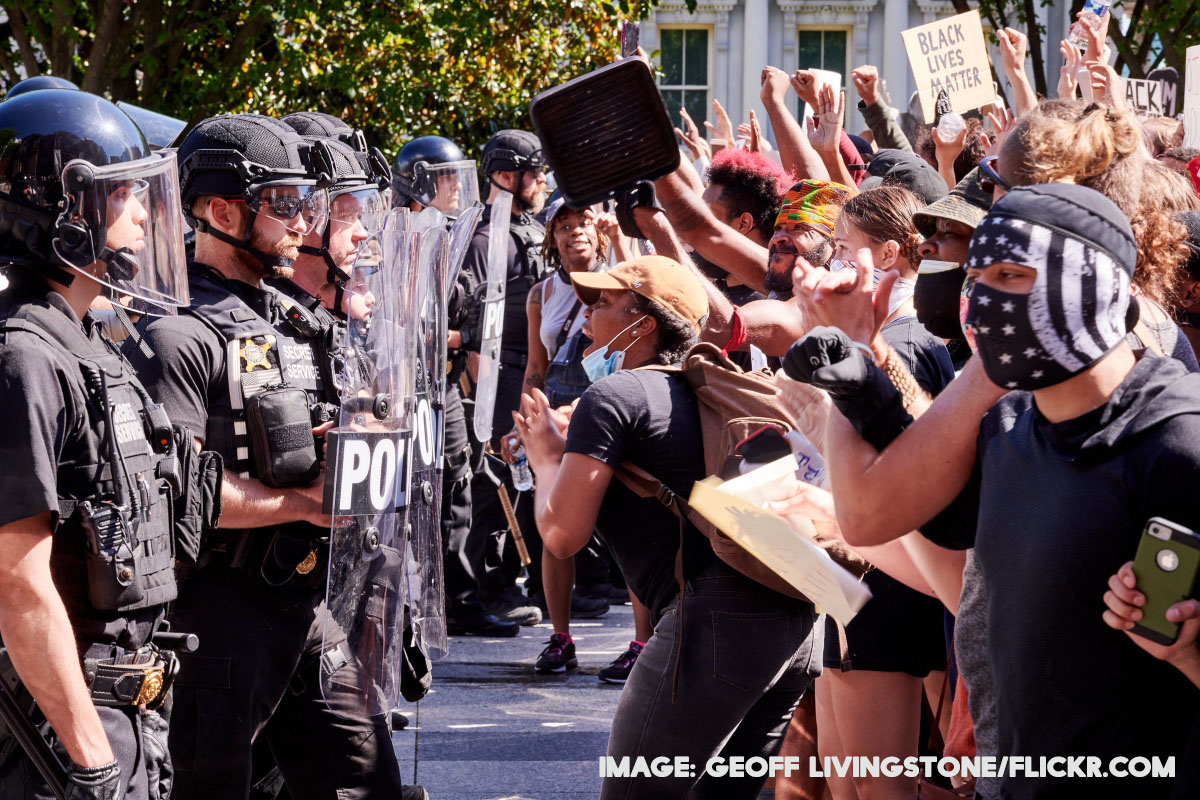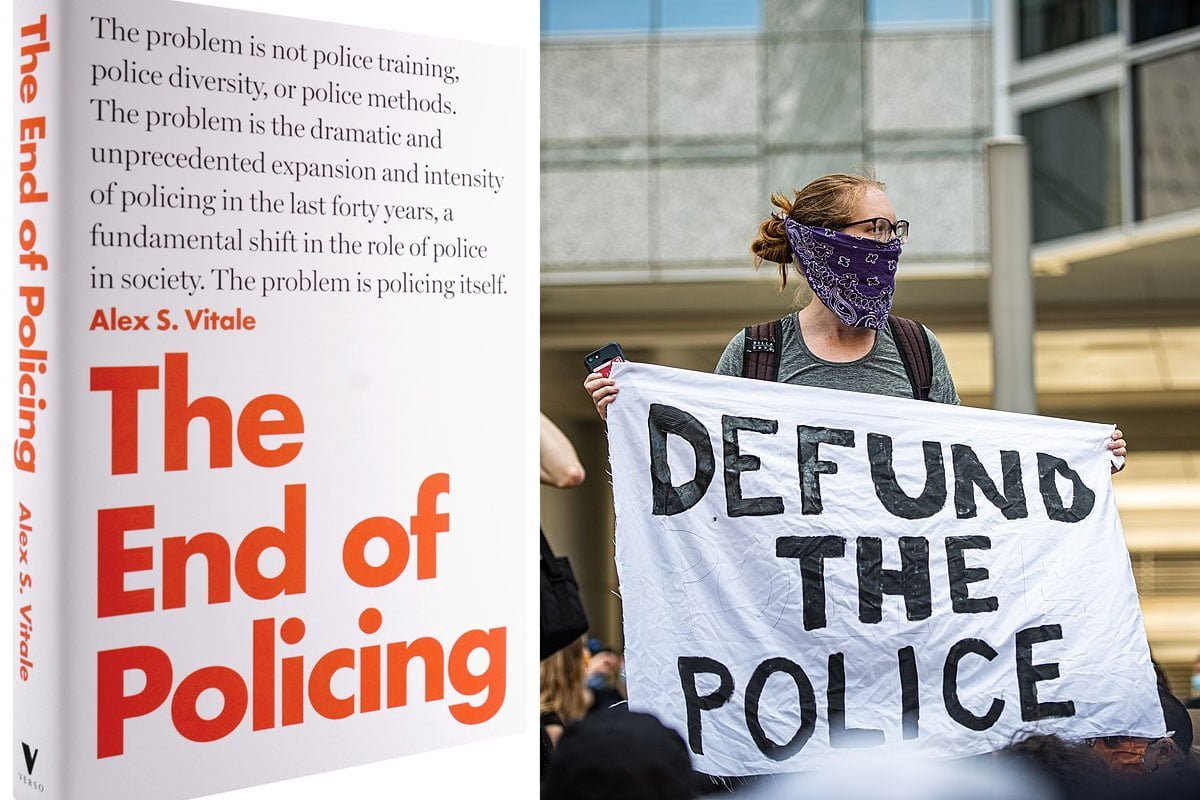Events in the USA make the title of Alex S. Vitale’s book ‘The End of Policing’ sound entirely plausible. The book argues that we should “defund the police” almost out of existence, and anything which remains should be subject to “community control”. Published in 2017, it’s clear why so many people are reading it now.
The police is an armed detachment of the state, designed to preserve the rule of a property-owning minority over the vast majority of working-class people. Vitale explains this history of the police, going back to the Metropolitan Police, founded in London by Robert Peel in 1829.
Peel learned – while crushing Irish rebellions against the British empire – that using regular troops to fire on crowds of protesters created martyrs and inflamed protests. Better to embed agents in troublesome communities, isolate the leaders, and arrest them.
After the Peterloo massacre in Manchester, the British ruling class felt in need of such tactics at home. This was the beginning of the police.
As well as quelling unrest, the role of the police was to discipline the new industrial working class. They enforced vagrancy laws; and in places like Pennsylvania, the police force was founded and funded by business owners as a strike-breaking force.
From its origins right up to the present day – via the Battle of Orgreave in Britain, the Vietnam protests, the Black Panthers, and COINTELPRO in the USA – the police has been used as a repressive force whenever working-class organisation poses a serious threat to capitalism.
Want to dismantle the corrupt justice system? Interested in further education on police abolition? The End of Policing by Alex S. Vitale is available as a FREE e-book through the publisher’s website! Pick up a copy and spread the word. https://t.co/x5L8Hs0gWK
— Sailor Moon Livetweet @ BLM (@SailorMoonSub) June 22, 2020
Capitalism: the real criminal
From this, Vitale draws two conclusions. Firstly, that policing has very little to do with crime control. He cites research showing no correlation between the number of police and the crime rate.
Secondly, the police are structurally anti-working class. In all countries, and especially the USA, the police use racism as one of many weapons to keep the working class weak, divided, and easier to control.
This is why so many black people die at the hands of the police; why they are many times more likely to be incarcerated; and why research proves that ‘cultural awareness’ training for officers, or having more black police officers, does nothing to address this racism. It is embedded into the institution of the police.
So, Vitale points out, the question is not how to reform the police, but how to change society. He explains that even if the police were to be perfectly trained and act professionally at all times, the laws they enforce and the kind of system the police is designed to protect is racist, oppressive and exploitative.
“A kinder, gentler, more diverse war on the poor is still a war on the poor,” he says. We would add explicitly – though Vitale does not – that it is capitalism that wages this war on the poor. That’s what must be done away with.
Police numbers and budgets in the USA have expanded, while social services have been destroyed, especially since the Clinton presidency. The result is police in schools enforcing discipline; tackling mental health crises; and dealing with homelessness, sex work, gang activity, and immigration. Criminalisation has become the norm, instead of curing the social issues which drive all these things.
Socialist solution
 The author suggests a few reforms to policing – decriminalising certain activities, and redistributing police budgets – that might improve the situation. But even he seems unconvinced that this is possible.
The author suggests a few reforms to policing – decriminalising certain activities, and redistributing police budgets – that might improve the situation. But even he seems unconvinced that this is possible.
“Even if we could somehow implement these changes, they would be ignored, resisted, and overturned – because of the institutional imperatives of the politically motivated war on drugs, disorder, crime etc.,” he writes in his conclusion.
What we need, he says, is a system that provides decent jobs, financial stability, and more power for organised labour, among other things. He also talks about the need for “participatory budgeting” and community control of the police.
Unfortunately Vitale doesn’t state the obvious conclusion that flows from his analysis: that capitalism cannot provide any of these things – only a democratically planned socialist economy can.
defunding the police is not an end goal of course. the goal is to live in a world where there is no policing or incarceration. but that’ll never happen under capitalism; they’ll always find a way to police us. therefore we must abolish capitalism to abolish the carceral state.
— defund the police now! ☭ (@socialistmic) June 21, 2020
State and Revolution
The book is an excellent read. But it is also a bit frustrating. Vitale gets the reader fired up about the need for a fundamental, socialist transformation of society (even if he doesn’t use that word). But he offers no explanation for how it can be achieved. He says “we” must do this or “we” must do that. But who is “we”?
The working class is presented as a passive victim of police violence, with organised labour seemingly a small piece of the puzzle. In this respect the book falls into the academic trap of providing analysis, but with no guide to action.
Vitale must address his ideas to the working class – because it is only this class, when it is organised, which can make the necessary changes to society. This is the only way to connect theory with practice.
Lenin also wrote about the state and the police in his pamphlet State and Revolution. He cut short his writing of that book because the October Revolution of 1917 broke out in Russia.
It’s not enough to have good ideas, we must participate in the class struggle to make them reality. In that spirit the last line of State and Revolution reads: “It is more pleasant and useful to go through the ‘experience of revolution’ than to write about it.”
It will only be the experience of a working class, socialist revolution, that can really bring about the end of policing.






